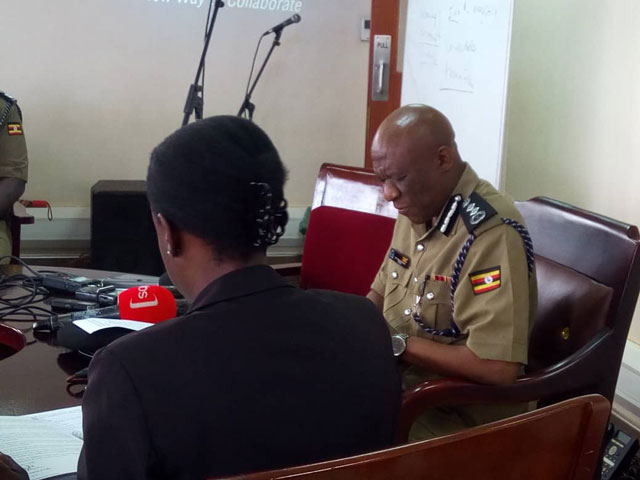
Kampala, Uganda |THE INDEPENDENT | The Inspector General of Police-IGP, Martin Okoth Ochola has ordered the immediate release of all the people arrested on charges of being idle and disorderly in line with the president’s directive. Ochola’s directive is contained in an October 1, 2019 circular addressed to all directors in the Uganda Police Force, Regional Police Commanders and Divisional/District Police Commanders. “I hereby instruct all police officers to fully comply with H.E the president’s directive on the above subject matter,” writes Ochola.
The letter is also copied to the Internal Affairs Minister, Permanent Secretary and Kampala Capital City Authority (KCCA), Executive Director. Ochola further directs that all the people arrested by KCCA enforcement officers and currently in prison for failure to pay a fine of 1 million be released with caution.
“By copy, hereof, the Executive Director Kampala City Council Authority is also asked to comply with the directive of H.E the President of the Republic of Uganda,” Ochola directs. ‘Idle and disorderly’ laws form part of what are usually referred to as ‘vagrancy laws.’
These are laws that criminalize persons regarded as ‘vagrants’- persons who wander from place to place and have no permanent home or employment, in effect the poor. Museveni has in the past ordered police and other authorities to stop arresting people for being ‘idle and disorderly”.
He reiterated the same message while presiding over the International Anti-Corruption day activities at Kololo Ceremonial grounds in December 2018. The idle and disorderly offence is punishable under section 167 of the Penal Code Act (which is a law providing for crimes and their punishments).
The Act criminalizes wandering persons, those gambling for cash or prostituting as being idle and disorderly and if convicted in court, they, if prostitutes or involved in soliciting for immoral purpose, face a maximum seven years imprisonment. Other aspects of the offence attract three months in jail or Shs. 3,000 fine or both.
A 2016 report by the Human Rights Awareness and Promotion Forum (HRAPF), a human rights advocacy NGO established that 958 idle and disorder charges were recorded between 2011 and 2015 at five sampled police stations in Kampala.
The report also indicated that victims of these arrests are marginalized persons who arguably rank lowest on the social and economic ladders like commercial sex workers, street dwellers, street children, drug users, beggars and hawkers among others.
Police normally carries out arrests under these laws in night swoops and operations, arresting large numbers of people. The report indicated that despite their popularity in implementation by the police, ‘Idle and disorderly’ laws are of very little prosecutorial value.
Statistics show that these offences are hard to prove and in most cases there is no evidence from police to warrant their sanction for prosecution. “Even most of those that make it to courts for trial suffer the same fate. More than half of the cases that went for trial (52.4%) were dismissed for want of prosecution,” says report.
Data also shows that a number of convictions on the offences are a result of the accused persons pleading guilty to the offences. The report attributes the pleas of guilt by suspects to avoid long detention periods.
These long detention periods are according to the report felt by the Uganda Prisons Services who reveal that the prisons harbor a sizable number of petty offenders charged with ‘Idle and disorderly’ offences. For instance, in 2012 alone, such offenders contributed 9.9% of the total prison population.
*****
URN
 The Independent Uganda: You get the Truth we Pay the Price
The Independent Uganda: You get the Truth we Pay the Price



